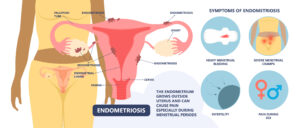WORDS LIM TECK CHOON
5 FACTS ABOUT ENDOMETRIOSIS
Click on the image for a larger, clearer version.
- It is a condition that sees tissue similar to that of the uterine lining growing outside the uterus, such as at the ovaries, fallopian tubes, and the tissue lining the pelvis.
- It can also be found in other areas of the body, but this is very rare.
- Endometriosis can cause debilitating pain, severe bloating, and fatigue, especially during one’s period.
- It can affect one’s ability to have children, as 30% to 50% of women with infertility also have endometriosis.
- Approximately 350,000 women in Malaysia may be silently suffering from this condition.
WOMEN SHOULD REACH OUT FOR MEDICAL ATTENTION IF THEY BELIEVE THAT THEY HAVE ENDOMETRIOSIS
| FEATURED EXPERT SURITA MORGAN Founder and President Endometriosis Association of Malaysia (MYEndosis) Website |
Surita Morgan tells us: “Malaysians are generally not aware of what endometriosis really is and why some women have this condition. One of the biggest reasons is because it is often considered as a taboo subject. People are simply uncomfortable speaking about menstrual health openly. But it doesn’t have to—rather, it shouldn’t—be that way.”
She adds: “We need to change the narrative around menstrual health and endometriosis. We need better research, better resources, and better recognition of this condition. By doing so, we can begin to pave the way for a future where endometriosis is not a burden anymore carried in silence, but a challenge met with understanding and solidarity.”
UNDERSTANDING ENDOMETRIOSIS
 FEATURED EXPERT FEATURED EXPERTDR LIZA LING PING Consultant Obstetrician, Gynaecologist, and Fertility Specialist TMC Fertility |
Dr Liza Ling Ping shares that endometriosis reveals itself in stages.
The First Stage or Minimal Endometriosis
At this stage, there are scattered patches of endometriosis tissue, often without symptoms or with mild pelvic discomfort.
The Second Stage or Mild Endometriosis
The number of tissue patches increases, potentially affecting fertility and causing discomfort during menstruation and intercourse.
The Third Stage or Moderate Endometriosis
There is further spread of endometriosis tissue, along with scar tissue and adhesions that can lead to chronic pelvic pain and digestive issues.
The Fourth Stage or Severe Endometriosis
This stage is characterized by extensive endometriosis tissue patches, large cysts, and significant scarring. There is intense pain as well as potentially impacting bowel and urinary functions.
CAN ENDOMETRIOSIS BE TREATED?
Dr Liza reveals that there is a range of treatments available such as laparoscopic surgery to specialized fertility treatments, all aimed at managing symptoms and preventing escalation.
Early diagnosis and intervention can open the door to effective treatment options that not only alleviate symptoms, but also improve quality of life, and even protect fertility.
Hence, she advises women that are affected by this condition to seek formal help and professional medical attention.




